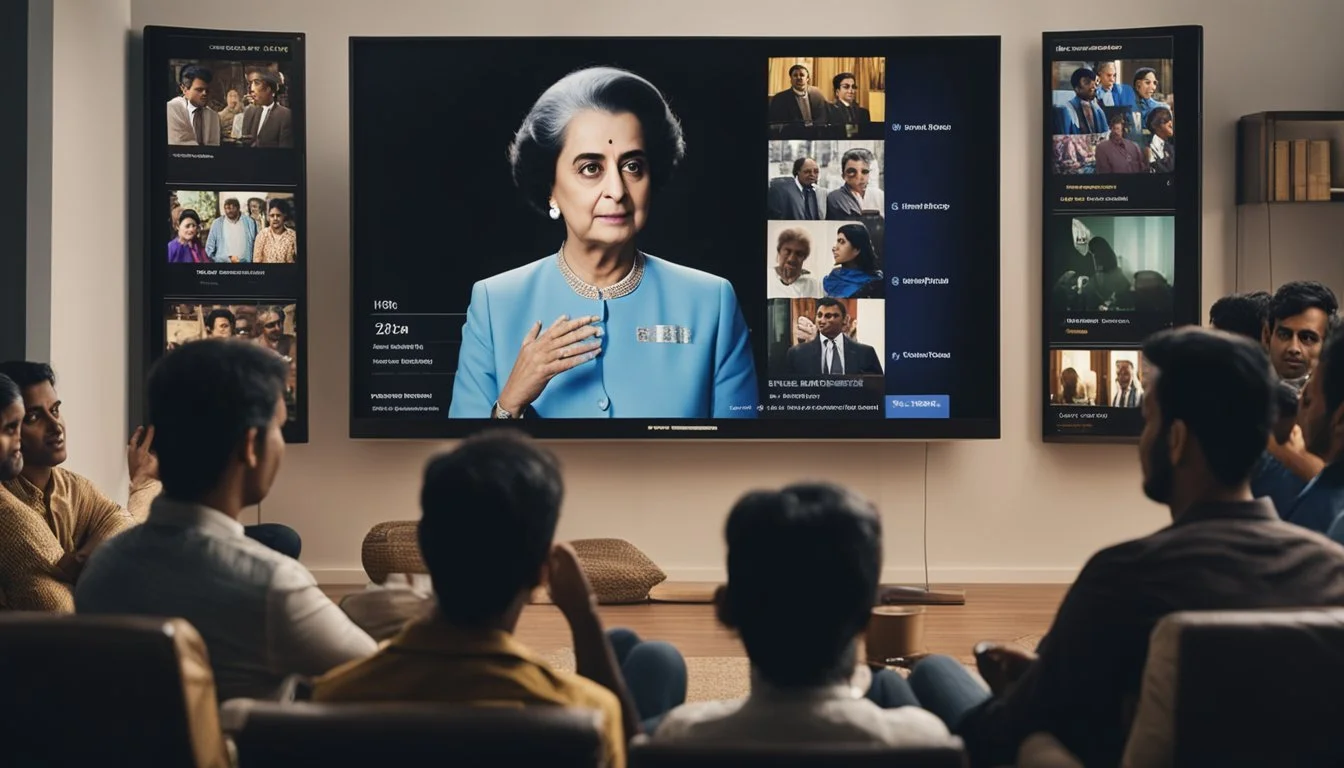6 Films Exploring the Political Legacy of Indira Gandhi
A Cinematic Insight
Indira Gandhi's tenure as India's Prime Minister marked a significant period in the country's political history. Her leadership, infamous for the declaration of the Emergency in 1975, has been the subject of extensive analysis and numerous cinematic representations. Filmmakers have consistently examined the profound impact of her policies and decisions on the nation.
Through the lens of cinema, viewers gain insights into both the triumphs and controversies associated with her administration. This article dives into six films that capture the complex political legacy of Indira Gandhi, offering a nuanced perspective on her influence and the era she helped shape.
1) Indira
The film "Indira" (1995) offers a compelling look at the political life and times of Indira Gandhi. Directed by Suresh Krissna, the film navigates her ascent to power, the obstacles she faced, and her profound influence on Indian politics.
Through a series of dramatic sequences, "Indira" highlights her policies and initiatives, presenting a nuanced portrayal of her leadership.
Set against the backdrop of her tenure as Prime Minister, the film explores her relationships with colleagues and adversaries. It delves into the key events that defined her legacy, such as the 1971 war and the controversial Emergency period.
"Indira" brings to life the multifaceted character that Gandhi was, balancing her resilience and her vulnerabilities. The film serves as an entry point for those seeking to understand her complex legacy.
More information on the film can be found on IMDb.
2) The Assassination of Rajiv Gandhi
The assassination of Rajiv Gandhi, a former Prime Minister of India, occurred on May 21, 1991. He was killed by a suicide bomber in Sriperumbudur, Tamil Nadu. The attack also claimed the lives of at least 14 others.
This tragic event has been the focus of various documentaries and films. Each attempts to portray the complex political and social repercussions of his death. One such film, "The Human Bomb" (2004), explores the details surrounding the assassination. This documentary provides a detailed account of the incident and its aftermath.
Another film, "Asphota - The Human Bomb" (2016), directed by A.M.R. Ramesh, delves into the events leading up to and following Gandhi’s assassination. It gives viewers an in-depth look into the political turmoil and investigative processes that ensued.
These films provide valuable insights into the impact of Rajiv Gandhi's assassination on India and its political landscape. They serve as important resources for understanding the ramifications of this significant historical event.
More information on The Human Bomb (2004)
More information on Asphota - The Human Bomb (2016)
3) Amu (2005)
"Amu" is a powerful drama film directed by Shonali Bose. It was released in 2005 and addresses the sensitive and tragic events following Indira Gandhi's assassination.
The narrative follows Kaju, an Indian-American woman, who visits India and discovers deep-seated political unrest that surfaced during the 1984 anti-Sikh riots.
The film's portrayal of political tension and societal upheaval highlights the complex legacy of Indira Gandhi's tenure as Prime Minister. It brings attention to the aftermath of her assassination and the subsequent violence.
Shonali Bose's direction ensures that "Amu" wears its political heart on its sleeve, providing a raw and emotional exploration of history. The film was critically acclaimed for its unapologetic approach to addressing sensitive historical events.
"Amu" serves as a poignant reminder of the dark times in India's history and the long-lasting effects of Gandhi's political actions. It remains an essential watch for those interested in the turbulent political landscape post-Indira Gandhi's era.
For more details, visit the IMDb page for "Amu".
4) Nine Hours to Rama (1963)
"Nine Hours to Rama" is directed by Mark Robson and released in 1963. This British-American film offers a fictionalized account focusing on Nathuram Godse, the assassin of Mahatma Gandhi. It explores his final hours before the assassination and the law enforcement efforts to thwart his plan.
Horst Buchholz plays Nathuram Godse, presenting a complex portrayal of his motivations and actions. José Ferrer stars as the police officer Gopal Das, highlighting the intense search to prevent the assassination.
Based on a 1962 novel by Stanley Wolpert, "Nine Hours to Rama" combines thriller elements with historical context. It was filmed in both England and India, giving it an authentic atmosphere. The screenplay was written by Nelson Gidding.
The film's realistic portrayal of the events leading up to Gandhi's assassination provides viewers with a gripping narrative rooted in a significant moment in history. The audience is drawn into the tension and urgency of the final hours.
For more information, visit Wikipedia or IMDb.
5) The Tashkent Files (2019)
"The Tashkent Files" is a thriller directed by Vivek Agnihotri. The film investigates the mysterious death of India's second Prime Minister, Lal Bahadur Shastri. It raises questions about whether Shastri died a natural death or was assassinated.
Shweta Basu Prasad takes on the role of a young journalist. She questions the official narrative and delves into unresolved aspects of Shastri's death.
The film features prominent actors like Mithun Chakraborty, Naseeruddin Shah, and Pankaj Tripathi. They portray various characters who contribute to the investigation.
Released in 2019, "The Tashkent Files" aims to shed light on historical events. It ignited debates and discussions across India regarding past political secrets.
The film received mixed reviews from critics. Some praised its daring subject matter, while others criticized its execution. Nonetheless, it remains a significant exploration of a key moment in India's political history.
For more information about "The Tashkent Files," visit the Wikipedia page.
6) Midnight's Children (2012)
Midnight's Children is a film adaptation of Salman Rushdie's renowned novel, directed by Deepa Mehta. The story intertwines with India's historical events, particularly the period of Partition and the subsequent political upheavals. The narrative centers on Saleem Sinai, a child born at the exact moment India gained independence in 1947.
Indira Gandhi, depicted as "The Widow," is a pivotal character in the film. Her portrayal reflects the controversial aspects of her tenure as Prime Minister, especially during the Emergency period from 1975 to 1977. The film emphasizes her use of power to dismantle opposition, including the Midnight Children's Conference.
The movie humanizes the complex political landscape of India. It delves into the corrupt practices and the resilience of the Indian people. Starring Satya Bhabha, Darsheel Safary, and Shahana Goswami, the cast brings the multifaceted story to life. Indira Gandhi's representation contributes to the discussion on her political legacy.
Midnight's Children explores significant themes like identity, power, and the impact of historical events on personal lives. The film remains a poignant depiction of a critical period in Indian history and the legacy left by its leaders.
For more information on Midnight's Children, visit IMDb.
Historical Context of Indira Gandhi's Political Legacy
Indira Gandhi's political journey is marked by her rise to power and the implementation of key policies that shaped India's political landscape. Her leadership was characterized by strong, often controversial, decisions and significant political reforms.
Early Political Career
Indira Gandhi began her political career influenced by her father, Jawaharlal Nehru, India's first Prime Minister. She served as his personal assistant and hostess, gaining valuable political insight and experience.
In 1966, after Lal Bahadur Shastri's sudden death, Indira Gandhi became India's first female Prime Minister. Her ascent was initially seen as a compromise candidate by her party, but she quickly established her own authority.
Her early tenure saw an emphasis on agricultural reform, aiming to address food shortages. The "Green Revolution," initiated during her term, significantly increased food production.
Despite facing internal party challenges and external political turbulence, Gandhi's resilience and firm policies solidified her position in Indian politics.
Major Political Policies
Indira Gandhi's tenure included several groundbreaking policies. Her decision to nationalize India's banks in 1969 aimed to ensure financial inclusion for all citizens. This move was both praised for its vision and criticized for its execution.
The state of Emergency, declared in 1975, marked one of the most controversial periods of her leadership. During this time, civil liberties were suspended, and political opposition was suppressed. This decision continues to spark debate regarding its impact on Indian democracy.
Her reforms in education, most notably the 10+2+3 structure for school education, sought to standardize and improve the quality of education. Gandhi's tenure saw numerous social and economic reforms, illustrating her approach to centralized planning and control.
Cultural Impact of Indira Gandhi's Leadership
Indira Gandhi's leadership significantly influenced Indian cinema, and she was a subject of both admiration and critique among the public.
Depictions in Indian Cinema
Indian cinema has often depicted Indira Gandhi's persona and political era. Films such as "Aandhi" (1975) drew direct inspiration from her life, though it faced censorship issues. "India's Most Fearless" portrays her role during the India-Pakistan war, highlighting her formidable resolve.
Documentaries and biopics have also examined her complex legacy. Titles like "Indira" offer a nuanced portrayal, reflecting her impact on Indian politics. "The Assassination of Rajiv Gandhi" takes an indirect yet poignant look at the aftermath of her rule.
Public Perception and Criticism
Public opinion about Indira Gandhi remains deeply polarized. Many viewed her as a champion of the underprivileged, lauding her efforts to eradicate poverty. Her slogan, "Garibi Hatao" (Remove Poverty), struck a chord with the masses, emphasizing her commitment to social equity.
Critics, however, underscore her authoritarian tendencies, particularly during the Emergency (1975-1977). This period saw severe curtailment of civil liberties and press freedom, leading to widespread criticism. Her leadership style inspired both reverence and resentment, shaping her enduring legacy.
In sum, Indira Gandhi's cultural impact is profoundly embedded in both Indian cinema and the public psyche, reflecting her multifaceted and contentious role in India's history.






